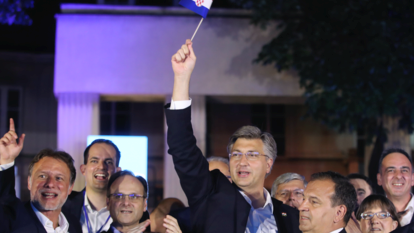Croatia
Parliamentary elections in Croatia
Surprise, surprise …
37.3 percent for the ruling HDZ and thus 66 seats out of 151 in the future „Sabor“ (parliament) is the unexpected result of yesterday’s parliamentary elections in Croatia, the best in 25 years and undoubtedly a triumph for its chairman and Prime Minister Andrej Plenković: „We have a very difficult government mandate behind us. And the challenges we face are even greater“, he said on election night.
The Social Democrats (SDP) and the „Restart“ alliance led by them only received 24.9 percent of the vote, giving them 41 parliamentary seats.
Even the most loyal supporters of the HDZ could hardly believe the initial forecasts of a spectacular victory on the sultry election evening of 5th July. And so the polling institutes were the first losers, as they had unanimously predicted a neck-and-neck race between the conservative HDZ and the “Restart” coalition led by the Social Democrats (SDP) in the last week before the election, with slight advantages for the opposition in the end.
The analyses of the coming days will show which role the historically low voter turnout (47%) had in this results. The decision to exclude persons infected with coronavirus from the election process caused quite a stir. A ruling by the Constitutional Court last Friday made it clear that this group of people also had the right to participate in the election. Accordingly, about 50 persons suffering from the coronavirus cast their votes with the help of trusted persons, while about 540 eligible voters in self-isolation could vote standing in front of their apartments or houses. In general, the polling stations were only allowed to be entered with masks and each person had to bring their own ballpoint pen/pen.
New Parliament - Possible coalitions
In the newly created constellation, the HDZ could form the government independently with the expected support of the national minorities (a total of eight mandates) and with the help of two splinter parties (the liberal HNS and the reformists, led by former HNS chairman Radoslav Čačić). The liberal HSLS, which was able to win two parliamentary seats through the pre-election coalition with the HDZ, was also to be part of the future government majority.
The firmly believed „kingmakers“ of the right-wing populist DP („Homeland Movement“) of the bard Miroslav Škoro can be pleased about their respectable success of 16 seats won from a standing start. They are thus the third strongest force in the new parliament. However, the now strengthened, moderately conservative Prime Minister Plenković will feel little desire to enter into a relationship with this group, especially since they openly campaigned against him (participation in government only without Plenković).
The populists of the right-wing party „Most“(Bridge) probably owe their increased share of votes (8 seats) mainly to the participation and popularity of the well-known journalist Nino Raspudić.
Preliminary analysis and evaluation
Political observers and experts agree that the prime minister, similar to 2016, was a decisive factor in the HDZ victory. The strategic decisions he made, such as the solo run of the HDZ (with the exception of three constituencies), the timetable of the election campaign and the selection of candidates had proved to be correct and purposeful. His self-confident performances and his superior appearance had had a calming effect on voters frightened by the resurgent pandemic, especially in the last weeks of the election campaign. He had apparently been able to keep his sporadic arrogance under control. He is now rewarded not only by the possibility of a comparably easy government formation with smaller parties, but also by an undisputed party leadership of a kind not seen since the times of President Tudjman.
In contrast, the rather pale candidate of the Social Democrats – the party leader Davor Bernardić – was clearly at a disadvantage. Even on the election posters he was not to be seen. The SDP also neglected its traditional clientele of workers and employees, which is why quite a few defected to the „Možemo“ („We can do it“) coalition. This new left-green alternative electoral alliance won seven seats. Another – smaller – competitor was the centrist alliance of three parties, including the liberal „Pametno“(Smart), which won three seats, one of them for Pametno – which thus became a parliamentary party for the first time. Even in its long-standing stronghold of Zagreb, the SDP was overtaken by the HDZ, which will not be without consequences.
Prospects
As a result of the crushing electoral defeat of the party „365 – Labour and Solidarity Party“ of the Mayor of Zagreb, Mr. Milan Bandić, who had been ruling the capital since 2000, a new situation is emerging in the political center of the country. In spite of the worsening economic crisis, all parties will be on the starting docks for the regional and local elections in May 2021 as early as September, especially for the race for mayor in Zagreb, Split and Pula.
In initial media reports, the election of several new personalities who are already known from public life is seen as a positive sign. Interesting debates on an intellectually higher level and more cultivated language are expected. This is a not insignificant factor in view of the expected challenges facing the second poorest EU member, especially in the economic and tourism sector.
The fact that all five liberal parties have at least managed to be represented in the new parliament – whether in government or opposition – during these difficult pandemic times should also be seen as an impulse not to slacken in their efforts for a liberal society. The have already announced their commitment to far-reaching reforms in the economic, judicial and educational sector (Pametno), to fighting for transparency and accountability in the public sector (HSLS) and for an open and modern Croatia (IDS).
